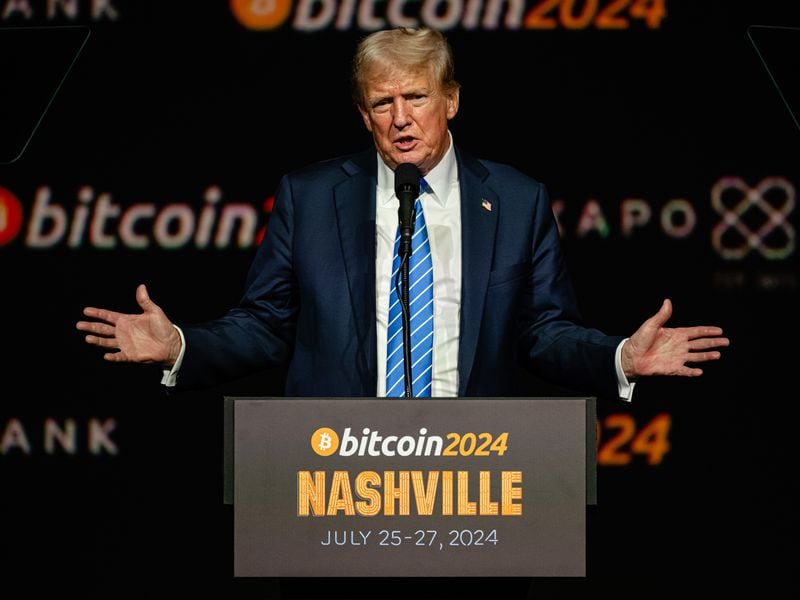Crypto
This year, crypto finally got its pol and his name is Donald J. Trump.
For years, this industry has struggled to find a voice in politics, someone who can channel its liberation ideology and bring its ideas to a wide audience. Now that guy is Trump.

02:38
‘High Likelihood’ Cardano Founder Charles Hoskinson Will Become Trump’s Crypto Advisor

01:42
Bitcoin Hits New $76K Record High, ETFs Post $620M Inflows

02:41
Bitcoin’s New All-Time High; U.S. BTC Reserve Hopes Fly

16:22
Bitcoin to Reach $100K by December or January: 10x Research Founder
He stands on a stage at the Bitcoin Conference, in Nashville, and says how much he likes crypto people. He announces a Bitcoin Strategic Reserve. He promises to free Ross Ulbricht. He hands out burgers at PubKey, in NYC. He even forms his own DeFi project, World Liberty Financial, complete with an insider-y governance model (what better way to signal one’s fidelity to crypto than that?)
Trump says and does all the things crypto wants to hear and he attracts millions in donations as a result. The loudmouths go to bat for him, culture warriors in performative hatred. He occupies political space that the Biden Administration and the Harris campaign could have occupied if they weren’t so craven to the Warren Wing. He says all the right things, because Trump is the master of saying what people want him to say. He fits perfectly with crypto’s goals, because his politics are adaptable to any situation and crypto was desperate for a friend.
I’ll confess that all this makes me personally uncomfortable, not because I have any great love for Kamala Harris, but because Trump has a long track record of being a fair-weather friend. He could just as easily take an entirely opposite view of crypto, if it suits him, and he has. I’m worried about crypto’s embrace of Trump because I find it hard to believe that Trump shares principles that attracted me to crypto.
Here, then, are three reasons why we, as an industry, should be wary, IMO.
Crypto 1) Trump may not follow through on his promises
A host of White House officials from the first Trump presidency have spoken of his unprincipled nature. John Kelly, his former Chief of Staff, says he fits the definition of a fascist: someone willing to overturn Constitutional norms to meet his goals.
Here’s what a former Trump White House official said this morning:
:format(jpg)/cloudfront-us-east-1.images.arcpublishing.com/coindesk/UK6EIGYGYBBDPO3VTWF6JLGSRA.png)
Seriously: Isn’t that something we should worry about? Isn’t it pretty strange to ally crypto’s cause of crypto with a person who, to put it mildly, is so unreliable? Isn’t it weird to join a personality cult when crypto is supposed to abhor single-points-of-failure.
Trump has to own the crypto issue in order to be crypto’s pol. Kamala Harris and team at times reached out to crypto in the last few months, showing they might play ball on the issue. The players in the Trump-Crypto dance this summer made it known that there was to be no dealing with Democrats. Why?
Because Trump has to be the guy: he wasn’t going to share the issue with Democrats. It was like that in Nashville. Elon Musk was expected to speak with Trump at the Bitcoin Conference. But, according to one insider and CoinDesk’s tracking of Musk’s jet, he turned around when Trump wouldn’t share the stage. Trump needs to be the guy.
To be sure, Dems gave up crypto all on their own. It started with mining, when, after the industry returned to the U.S., all the new plants went to red states. Democrats began outlawing bitcoin mining as environmentally hazardous while Texas and others embraced it as a part of their grid flexibility programs. Personally, I’m all in favor of mining being part of the electrical grid, and Democrats were stupid to outlaw mining and lose the industry.
But the interesting question is how Trump might react if the Democrats did start supporting crypto in earnest.
Crypto 2) Alienating people outside the party
In its search for power and relevance, crypto has allied itself with the Republican party. It often hasn’t said so publicly, but it has. The people running its campaign groups are Republicans. Its favored down-ballot candidates are largely Republicans. When groups like Stand With Crypto implore people to vote, you know they’re not talking about voting for Senator Elizabeth Warren (D-MA).
These campaign groups aren’t always explicit in their preferences. But their allies are and the effect is often exclusionary. Here, for instance, is Ryan Selkis, once of Messari, discussing his feelings about liberal white women today.
It’s a free country and Selkis can say what he wants. He might even believe he’s being brave making such statements. But, seriously, is this good for crypto? How does language like this accord with the goal of wider crypto adoption? Aren’t liberal white women, and the other groups Ryan has slandered 24/7 for the last six months going to be turned off? Might they think crypto is made up of big bad bros like Mr. Selkis? If you’re trying to build a wide crypto movement, surely you don’t want to antagonize women.
Crypto 3) Crypto will be associated with policies nothing to do with crypto
When I first heard the term “single-issue voter” in reference to crypto earlier this year, I immediately thought BS. How can you support a candidate or party on a single issue? Electoral politics doesn’t work like that. When you support someone like Trump, by default you support a wide range of policies.
So, when crypto gives Trump $10 million to reinterpret the Howey Test, it’s also supporting (in no particular order and to pick just a few Trump policies) a “peace deal” (a.k.a. capitulation) on Ukraine, mass deportations, and antipathy to abortion and transgender rights. Is that where crypto wants to be culturally-socially spea

